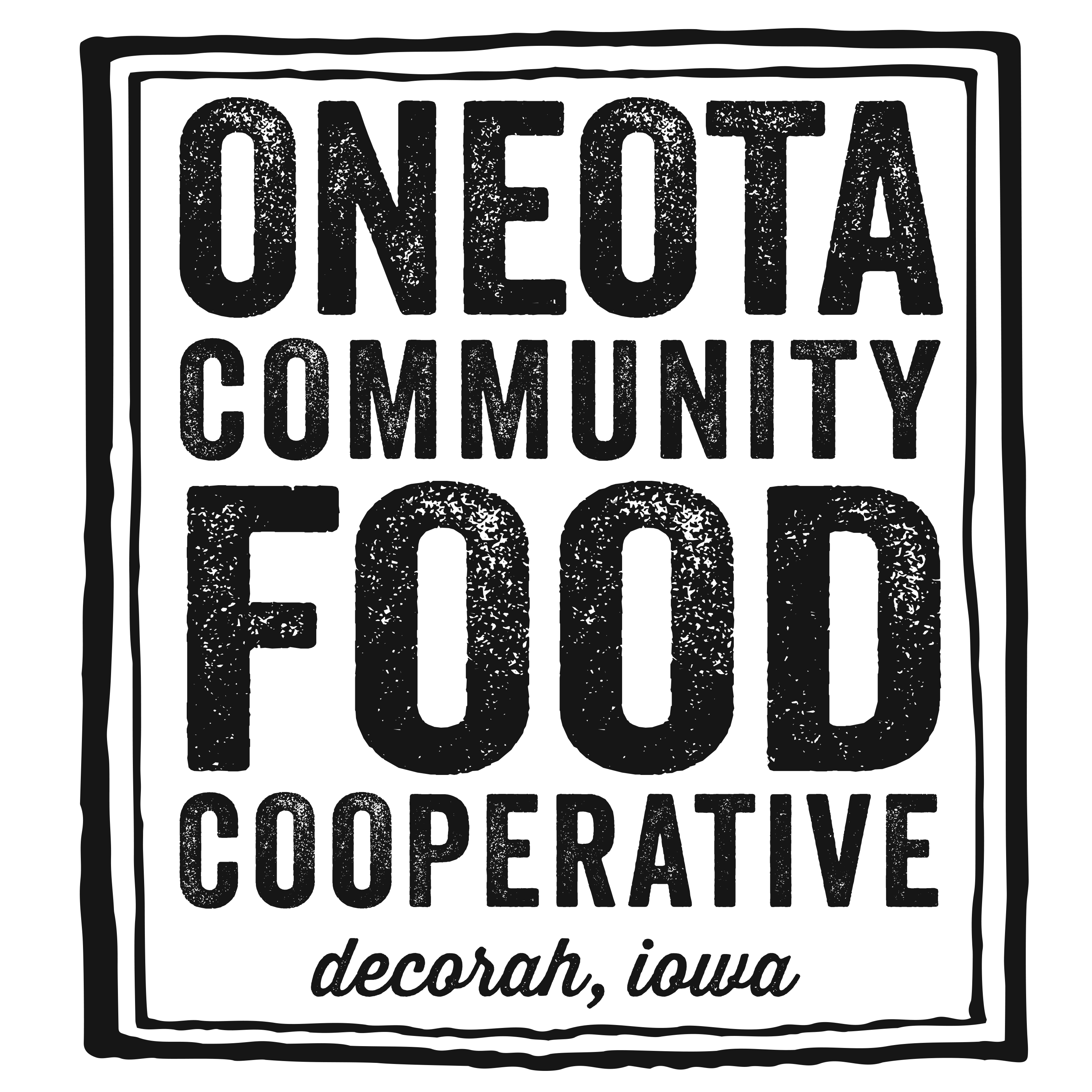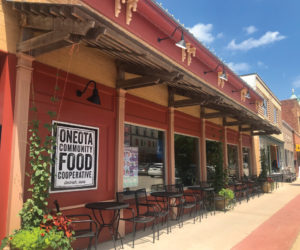The Oneota Co-op Round Up at the Register event for Sustainable Iowa Land Trust will continue through Monday, Sept. 26. Shopper round ups will be generously matched by Lyle and Sue Luzum of Decorah, who donated the 170 acre Luzum Heritage Farm to SILT in 2017. Shoppers are offered the opportunity to round to the next dollar at purchase. Additional round up amounts, up to one hundred dollars, also are an option during Co-op Round Up at the Register events.
This donation opportunity is held simultaneously with the organization’s annual fundraiser, SILT Fest, to be held virtually. The public is invited to follow SILT’s Facebook and Instagram accounts during Virtual SILT Fest for raffle drawings and organizational news. An in-store “tabling” event with Lyle Luzum and SILT Public Outreach VISTA member Sophie Sheeder is scheduled for Saturday, Sept. 24 at Oneota Co-op. Watch the Co-op’s social media platforms for details.
A SILT Conversation – Part 2
By Tanya O’Connor
There’s been lots of SILT talk at your Co-op this week. Those staffing our Front End registers, myself included, have witnessed many shoppers generously “rounding up” to benefit the Sustainable Iowa Land Trust mission.
I had a friendly senior checking out at my register one morning this week. This gentleman was purchasing fresh local veggies, bulk oatmeal and, as he told me, “my wife’s vitamins and spices.” When I asked him if he’d like to round up, he asked me to tell him more. Gotta love that.
Turns out this shopper is a retired farmer. When I described to him land access to young farmers and land for small farms and land being conserved and land being used to grow food for people (and all as briefly as possible), he looked down at his hands and said this:
“farms need a little bit of wild.”
Well that stuck with me. I was once a farm kid whose dad said pretty much the same thing plenty of times. My dad would leave land unplowed “for the creatures” because “the ground’s no good without them.” I grew up in DDT days on a farm that didn’t use it – or other chemicals – and that was not common at the time. When I complained I was tired from chores (frequently) he’d tell me that “land gets tuckered out too.” Then he’d tell me to go take a pasture nap.
 So when Lyle Luzum expressed to me that his parents taught him a “strong conservation ethic” I was listening. Luzum’s parents, says Lyle, “were county pioneers in the (Winneshiek County) soil and water conservation movement.” His father served as a Soil and Water Conservation District (SWCD) commissioner for 12 years. When the time came, Lyle served too – as a SWCD assistant commissioner for 40 years. This provided years of learning – and then, of leading.
So when Lyle Luzum expressed to me that his parents taught him a “strong conservation ethic” I was listening. Luzum’s parents, says Lyle, “were county pioneers in the (Winneshiek County) soil and water conservation movement.” His father served as a Soil and Water Conservation District (SWCD) commissioner for 12 years. When the time came, Lyle served too – as a SWCD assistant commissioner for 40 years. This provided years of learning – and then, of leading.
“What became apparent to me over time,” recalls Lyle, “is that this land should not have been stripped for farming. It should be woodland and pasture, primarily.” This sentiment led the Luzums to reforest 24 of the Luzum Heritage Farm’s 170 acres. It also is one reason, notes Lyle, that “SILT’s mission to protect the land, not just for farming, but for resource conservation, fits so well with us. It is a comfort to have that alternative to what we currently see. As individuals we can only protect this legacy during our lifetimes. SILT can, and is required to, protect it into the future.”
Service to SILT
SILT is a multi-faceted nonprofit, with leadership drawn from multiple avenues. The organization is directly served by 11 employees and advisers. Its board of directors (also 11, and on which Lyle serves) offer collective expertise in land, legal, financial matters and more. The SILT Advisory Council’s current 25 members represent a tapestry of conservationists, regional planners, public servants, investors, educators, farmers, and more – including Iowa Poet Laureate Mary Swander, whose production “Map of My Kingdom” centers around the challenges of intergenerational farm transfer.
Luzum has served the SILT board since 2018. By that time, he says, “SILT had started on the road to accreditation by the Land Trust Alliance – an umbrella organization of land trusts.” The purpose of the Land Trust Alliance, he adds, is to “support land trusts to carry out their perpetual responsibility to protect the land as they promise their donors they will.” This process is designed in multi-year steps to ensure the land trust’s policies and procedures remain supportive in perpetuity. As a member of SILT’s Policy and Accreditation Committee, Lyle was one of those guiding the organization through the accreditation process. He was chair in 2021 during SILT’s final year of application; in 2022 SILT was granted Land Trust Alliance accreditation.
“It’s a big step for SILT,” says Lyle regarding accreditation. “This works to assure potential donors that we are in this for the long haul.” Learn more in a Land Trust Alliance blog about SILT’s current “Circle our Cities” campaign here: https://www.landtrustalliance.org/blog/campaign-create-local-food-farms.
“An idea whose time has come”
I asked Lyle about SILT’s challenges, sustainability and future. He readily articulated the day to day operations of a nonprofit, the groundwork, the everyday business that isn’t necessarily in the public eye – and the literal amount of time processes take (his own family was in SILT conversations for two years prior to donation). This is why annual, planned donation is as critical as campaign-driven fundraising.
“Ongoing operational funding is always difficult,” says Lyle, “because we as individuals tend to think of an organization’s big ‘projects.’ So support for operational, keep-the-lights-on work (which includes writing grant proposals, which fund the big projects) is the biggest ongoing challenge.”
Lyle points out that all non-profits, and most start-ups, will experience growth challenges, “matching growth and potential,” he notes, “with capabilities and moving through the plateaus of organizational change.” A time comes, he adds, when an entity may progress “from a founder’s vision to something that thrives beyond that.”
It’s noteworthy that SILT didn’t have a significant precedence to look toward as a new land trust dedicated to affordable land access and table food production. The concept was a new one when SILT was founded, and remains unusual today. “(Because) SILT is pretty much unique in the U.S.,” says Lyle, “many of our processes are on the ‘bleeding edge’ – inventing as we go. That is both exciting and a bit daunting.”
Since its 2015 founding, he adds, SILT has attracted attention across our nation. The reason? “SILT is an idea whose time has come,” states Lyle.
….”the most massive generational land transfer ever”
Lyle reflects on what we may learn from SILT, and what we have to lose when it comes to diminished land access, here:
“I hope SILT can help us all understand that there is room for a wide diversity of agriculture, and that (what has now become) non-conventional agriculture and farmers can be a backbone for a strong, widespread local, sustainable food system. We take it for granted here in Decorah (and the surrounding area) because we have had many real local food pioneers – and Oneota Co-op has been a backbone of that for 48 years. We are lucky. SILT wants to continue to strengthen what is available and for other places to have that.
“Usually you don’t know what you’ve lost until it’s gone. Then you have to remake the wheel, and that takes new thinking and a lot of work to undo a loss. We see that with the lost processing infrastructure, which makes local meat growing difficult. We are in the midst of the most massive generational land transfer ever and SILT is working to keep land from being lost to development or massive industrial agriculture.
“Money, and land ownership, floats to the top and fewer and fewer hands. And once land has changed hands into an investment portfolio, it won’t come back. Time is short. But SILT is here now with an alternative future for family owned land. SILT saved our farm.”
Lyle and Sue Luzum now reside in Decorah. Their daughter, Steph, grew up on the Luzum Heritage Farm and today has a non-farm family life. Sue, notes Lyle, may have grown up in a Chicago suburb before she met Lyle as a Luther student – but she became a great gardener on the farm. They hoped, upon retirement, to find a future for their farm that didn’t involve sadness or regret. “SILT provided that,” says Lyle, “No regrets. No sadness. Just gratefulness.”
 As SILT turns Seven
As SILT turns Seven
The Co-op thanks SILT Executive Director (and co-founder) Suzam Erem for sharing the numerous happenings surrounding SILT thus far in 2022. We invite readers to learn more here.



